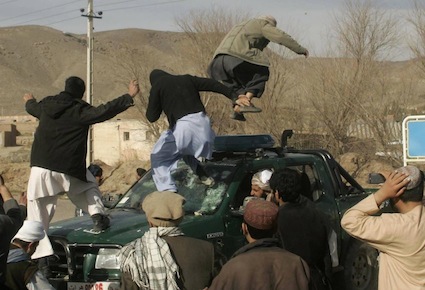
Amerikan Occupiers Still Losing
The point of guerrilla war is not to succeed,
it’s always been just to make the enemy bleed.
Depriving the soldiers of the peace of mind that they need.
Bullets are hard to telegraph when they bob and they weave.
The only way a guerrilla war can ever be over,
is when the occupation can’t afford more soldiers.
Until they have to draft the last of you into the service,
and you refuse because you don’t see the purpose.
- Immortal Technique, the Martyr

In just over a week, six Amerikan soldiers have been killed by Afghan patriots within the state military that is supposedly working with the U.$. occupation. Nominally triggered by reports of the U.$. military burning copies of the Koran, these killings bring the number of NATO troops killed by their Afghan “allies” to 36 in the last year. This is a significant increase from previous years and some have suggested no other “native ally” of U.$. imperialism has compared.(1) While tiny in comparison to the loss of life by the occupied population, these incidents support the assessment that the United $tates continues to lose their war on Afghanistan. The deaths of Amerikans, while providing fuel for anti-Afghan propaganda, frightens the Amerikan public away from participating in ground wars. It took a long 9 years to turn Amerikan public opinion towards pulling troops out of Afghanistan, and Afghans are still fighting to get them out.(2)
There are two incorrect bourgeois narratives underlying the reporting on recent events. One attempts to hide the fact that the nation has faced a brutal occupation for over a decade, as if Afghans are just irrationally responding to the minor incident of the burning of some books. The second narrative is that there is an outside radical religious element, which must be distinguished from the greater Afghan nation that wants to work with Amerikans. This narrative was used against the Taliban for years before the invasion by U.$. troops even began. The truth being (however flimsily) covered by both of these narratives is that the Afghan nation has supported a decade-long war of resistance to the imperialist occupation led by Amerika. A parallel might be drawn to the media’s portrayal of the prison movement where the outside element is “criminal gangs” and resistance is pinned to issues like wanting TV or better food.
In a recent report on NPR, an official stated that USAID had to hide the fact that they were giving aid to the Afghan people, because no one in the country would be seen with a blanket or food with a U.$. flag on it. This fact is a clear demonstration that either the resistance is the Afghan people, or the “outside radical element” is so prolific as to make distinguishing it from the Afghan people irrelevant. Meanwhile, the funeral of an Afghan air force colonel that killed nine Amerikans was attended by 1500 mourners last year.(3) Since this article was first drafted another bomb struck near Bagram Air Force Base where the Korans were burned on March 5. On March 8 the Taliban infiltrated Afghan police in Oruzgan and killed nine of them, while six British occupiers were killed during an attack on their vehicle in Helmand province. Our strategic confidence comes from examples like this, where whole countries have united to reject and fight imperialism. Comparing these conditions to those in the United $tates demonstrates our line on where guerrilla war is possible and not.
“Time works for the guerrilla both in the field – where it costs the enemy a daily fortune to pursue him – and in the politico-economic arena.”(4) The occupation of Afghanistan is estimated to have cost as much as $500 billion(5), with sources reporting costs per Amerikan soldier at $850,000 up to $1.2 million a year.(6) While almost all of this money goes to U.$. corporations and their employees supplying the soldiers, even bourgeois economists have recognized that militarism is not a sustainable way to prop up a capitalist economy. What they fail to acknowledge is that only a socialist economic system that produces for need, not profit, can eliminate the inherent contradictions in production where circulation of capital must always increase in the interest of profit.
“There is no great novelty in [guerrilla tactics], nor can the Marxist-Leninist camp claim any special credit for it. What is new – and Mao is the apostle and the long Chinese revolution the first proving ground – is the application of guerrilla activity, in a conscious and deliberate way, to specific political objectives, without immediate reference to the outcome of battles as such, provided only that the revolutionaries survive.”(7)
We are coming out of a period where the universality of Maoism has been dirtied by an association of communism with revisionists and First Worldists. Islam continues to unite the national liberation movement in Afghanistan, while “communism” has an association with foreign invasion. While socialism is necessary to meet the needs of the people of Afghanistan, the movement’s ideology so far has kept it isolated from the toxic politics of the First World. This will work in their favor as the people’s struggle reaches higher stages.
Here in the United $tates we must continue to find creative ways to help the Afghans’ heroic struggle to whittle away at Amerikan support for occupation. And we must learn from the events in Central Asia about who are our friends and enemies, what is possible where, and what it looks like to take on a long struggle with the confidence that you are on the right side of history.








